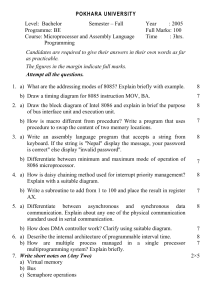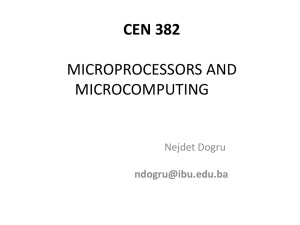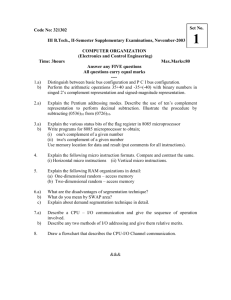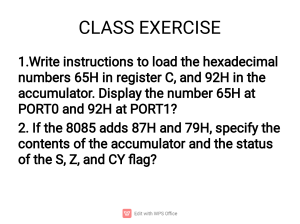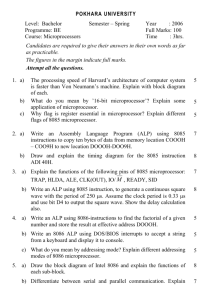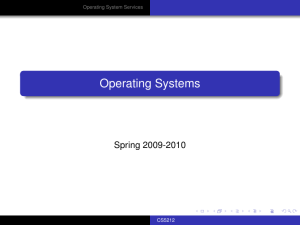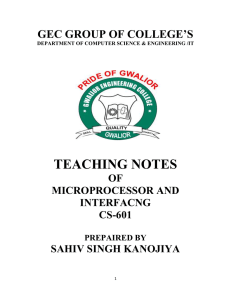micro_processorunit1_2marks (1)
advertisement
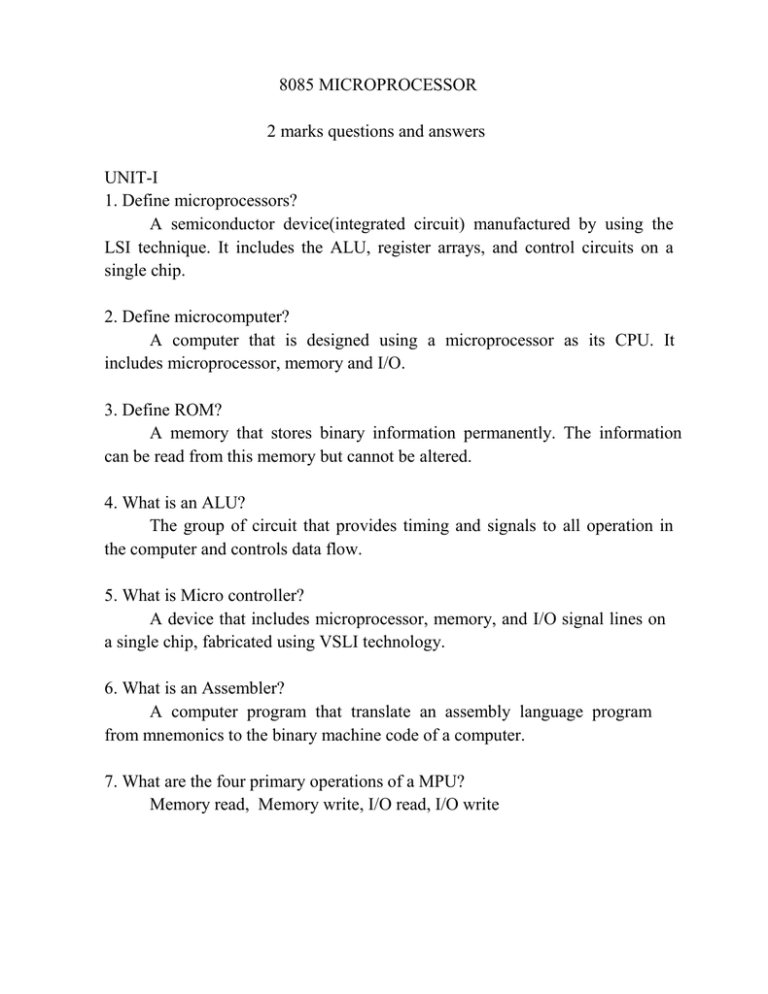
8085 MICROPROCESSOR 2 marks questions and answers UNIT-I 1. Define microprocessors? A semiconductor device(integrated circuit) manufactured by using the LSI technique. It includes the ALU, register arrays, and control circuits on a single chip. 2. Define microcomputer? A computer that is designed using a microprocessor as its CPU. It includes microprocessor, memory and I/O. 3. Define ROM? A memory that stores binary information permanently. The information can be read from this memory but cannot be altered. 4. What is an ALU? The group of circuit that provides timing and signals to all operation in the computer and controls data flow. 5. What is Micro controller? A device that includes microprocessor, memory, and I/O signal lines on a single chip, fabricated using VSLI technology. 6. What is an Assembler? A computer program that translate an assembly language program from mnemonics to the binary machine code of a computer. 7. What are the four primary operations of a MPU? Memory read, Memory write, I/O read, I/O write 8. What do you mean by address bus? A group of lines that are used to send a memory address or a device address from the MPU to the memory location or a peripheral. The 8085 microprocessor has 16 address lines. 9. How many memory locations can be addressed by a microprocessor with 14 address lines? The 8085 MPU with its 14-bit address is capable of addressing 14 2 =16,384 (ie) 16K memory locations. 10. Why is the data bus bi-directional? The data bus is bi-directional because the data flow in both directions between the MPU and memory and peripheral devices. 11. What is the function of the accumulator? The accumulator is the register used to store the 8-bit data to perform the arithmetic and logical operations. 12. Define control bus? This is single line that is generated by the MPU to provide timing of various operations. 13. What is a flag? The data conditions, after arithmetic or logical operations, are indicated by setting or resetting the flip-flops called flags. 14. Why are the program counter and the stack pointer 16-bit registers? Memory locations for the program counter and stack pointer have 16dit address. So the PC and SP have 16-bit registers. 15. Define memory word? The number of bits stored in a register is called a memory word. 16. Specify the number of registers and memory cells required in a 128 x 4 memory chip? Number of registers=128 Memory cells required is 128 x 4=512 17. Explain the function of ALU and IO/M signals in the 8085 architecture? The ALU signal goes high at the beginning of each machine cycle indicating the availability of the address on the address bus, and the signal is used to latch the low-order address bus. The IO/M signal is a status signal indicating whether the machine cycle is I/O or memory operation. The IO/M signal is combined with the RD and WR control signals to generate IOR, IOW, MEMW, MEMR. 18. If the 8085 adds 87H and 79H, specify the contents of the accumulator and the status of the S, Z, and CY flag? The sum of 87H and 79H=100H. Therefore, the accumulator will have 00H, and the flags will be S=0, Z=1, CY=1. 19. Write down the control and status signals? Two control signals and three status signals Control signals: RD and WR Status signals: IO/M, S1, S2 20. Define machine cycle? Machine cycle is defined, as the time required completing one operation of accessing memory, I/O, or acknowledging an external request. 21. Define T-state? T-state is defined as one subdivision of the operation of performed in one clock period. 22. Give the bit positions reserved for the flags? D7 D6 A Z D5 D4 D3 D2 D1 D0 AC P CY 23. Define instruction cycle? Instruction cycle is defined, as the time required completing the execution of the instruction. 24. What is an instruction set? The entire group of instructions, determines what functions the microprocessor can perform is called instruction set. 25. Give the functional categories of 8085 micro instructions? o Data transfer operations o Arithmetic operations o Logical operations o Branching operations o Machine control operations 26. Define Opcode and operand? The operation to be performed is called Opcode. The data to be operated is called operand. 27. Define the types of branching operations? Jump: to test the conditions Call, Return, And Restart: Change the sequence of the program. 28. Define two-byte instruction with one example? In a 2-byte instruction, the first byte specifies the Opcode; the second byte specifies the operand. Example: Opcode operand MVI A, Data 29. Write instructions to load the hexadecimal numbers 65H in register C, and 92h in the accumulator A .Display the number 65H at PORT0 and 92H at PORT1? MVI C, 65H MVI A, 92H OUT PORT1 ; DISPLAY 92H MOV A, C OUT ; COPY C INTO A FOR DISPLAY PORT0 ; DISPLAY 65H HLT 30. What is the machine control operations used in 8085 microprocessor? HLT: Halt NOP: No Operation 31. What is data transfer instructions? The data transfer instructions copy data from one source in to a destination without modifying the content of the source. 32. Give the instructions that perform the logical operations? o AND, OR, Exclusive-OR o Rotate o Compare o Complement 33. What is a three-byte instruction? In a three-byte instruction, the first byte specifies the Opcode, and the following two bytes specifies the 16- bit address. 34. Define Memory mapped I/O? `Instead of a memory register, if an output device is connected at the address, the accumulator contents will be transferred to the output device. This is called memory mapped I/O. 35. What is an interrupt I/O? The interrupt I/O is a process of data transfer whereby an external device or a peripheral can inform the processor that it is ready for communication and it requests attention 36. What is SIM? SIM: Set interrupt Mask. It is a 1-byte instruction. Used for three functions To set the Mask , To reset the flip flop, Implement the I/O 37.What is RIM? RIM: Read Interrupt Mask Used for three functions To read interrupt mask, To identify the pending interrupt , To receive serial data. 38. What the two categories of an interrupt? Four Maskable interrupt, One Non Maskable interrupt 39. What is the purpose of an interrupt enable? The instruction Enable Interrupt sets the Interrupt Enable flip-flop and enables the interrupt process 40. What do you mean by control logic? This has two pins. INT as an output, and INTA as an input. The INT is connected to the interrupt pin of the MPU. 41. What are the two modes of DMA execution? Slave Mode, Master mode
